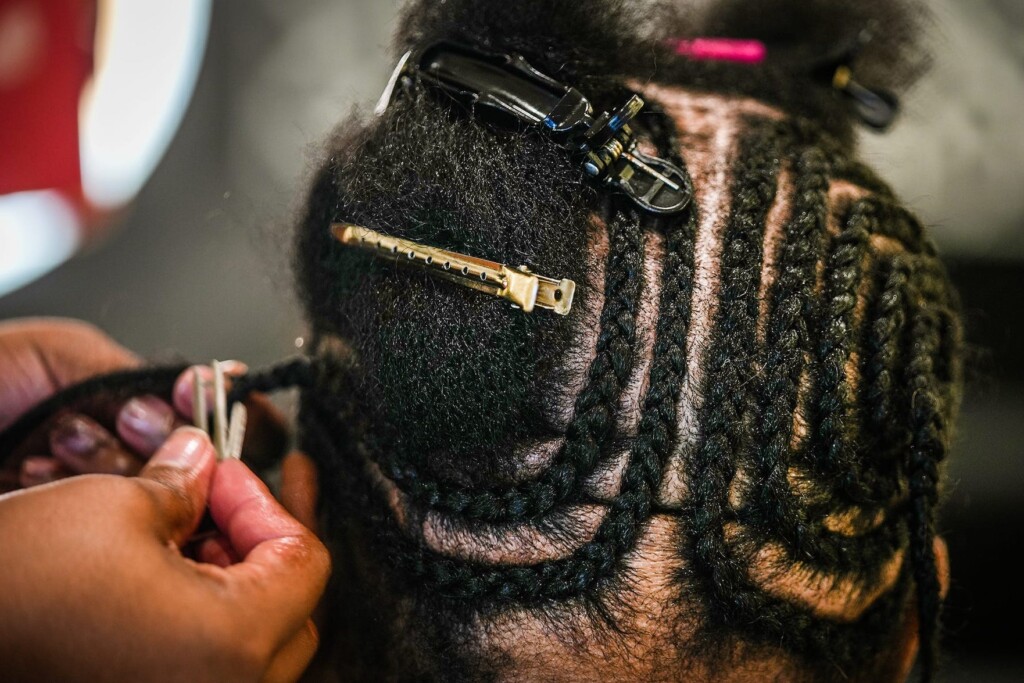On March 22, WFAA reporter Tashara Parker stood before eight members of the Texas House of Legislature’s State Affairs committee in Austin, her hair swinging in a long braid behind her back. She had waited almost 11 hours to speak. At the podium, she asked the legislators to imagine “walking into work carrying the weight of an identity that was not your own.” That their natural hair—be it straight or textured, braided, in locks (also known as dreadlocks), or flat-ironed—was deemed “unprofessional.”
The subject of Parker’s testimony, House Bill 567, would make such discrimination illegal.
Standing for “Creating a Respectful and Open World for Natural Hair,” or CROWN, House Bill 567 would prevent discrimination against someone based on their hairstyle or hair texture “commonly or historically associated with race.” The bill overwhelmingly passed the State House of Representatives 143-5 April 13, and in the State Senate 29-1 nearly a month later on May 12. Gov. Greg Abbott signed the bill into law over the weekend. It goes into effect on September 1.
On May 24, Dallas City Council passed a resolution in support of H.B. 567, encouraging Governor Greg Abbott to sign it into law.
“The CROWN Act is Civil Rights legislation that will affect and improve the lives of countless Texans,” said Rep. Rhetta Bowers for District 113 in Garland, who co-authored the bill, in a statement to D Magazine.
The bill’s language bans entities like schools and employers from enacting grooming or dress code policies that discriminate against natural hair or protective hair styles that are historically tied to race, including braids, locks, and twists.
Traditionally, these were “conversations that take place at home,” DART Police officer Dakari Davis told the Dallas City Council last week. In 2019, Davis was told by a superior that his cornrow hairstyle was unprofessional. He was ordered to change his hair. When he didn’t, he was investigated and relegated to desk duty. “I was segregated from engaging with the community as a police officer for almost a year.”
“People have approached me and asked if the CROWN Act is even needed,” Bowers said, “and the answer is an absolute yes. This kind of discrimination is very real, and very insidious.”
According to a 2023 study from Dove, Black women’s hair is 2.5 times more likely to be perceived as unprofessional. Black women with coily or textured hair are two times more likely than Black women with straightened hair to experience microaggressions at work. More than a fifth of Black women aged 25–34 have been sent home from work at some point because of their hair.
“My appearance reflects the community I serve, and my hair does not create a safety hazard.”
Dakari Davis
Anti-natural hair policies are a “carryover from the institution of slavery,” said Dallas County Commissioner John Wiley Price. In 1786, Louisiana, then under Spanish rule, enacted the Tignon Laws, which forced Black women in New Orleans to wear a headscarf to indicate they were part of the slave class, regardless of whether they were free or not.
Over the years, Black women and men have been forced to change their hair to fit a “certain standard of professionalism” that’s been conditioned to look straight, Parker said in her testimony. “Are we relying on old, outdated policies that likely weren’t developed by a lot of people that looked like me?”
During the Civil Rights Movement, many activists wore their hair in afros. But it wasn’t until 1976 that the Seventh Circuit U.S. Court of Appeals deemed in Jenkins v. Blue Cross Mutual Hospital Insurance that discrimination against afros in the workplace was illegal under the 1964 Civil Rights Act.
But beyond afros, discrimination against historically and culturally Black hairstyles is not yet illegal at the federal level. While a version of the CROWN Act passed the U.S. House of Representatives in March 2022, it did not pass in the U.S. Senate. “We need to learn to appreciate people and their culture,” Price said. “This is 2023.”
Political strategist and activist Adjoa B. Asamoah concepted the CROWN Act in 2018. “Preserving and protecting people’s civil, human and individual rights requires a thoughtful and intentional and collective approach,” Asamoah told the Texas Senate State Affairs committee on May 9, per the Texas Tribune. In early 2019, the CROWN Coalition was formed by Dove, National Urban League, Color Of Change, and Western Center on Law and Poverty to support the act.
In January 2019, the first CROWN Act bill was introduced in California by state Sen. Holly J. Mitchell. It was signed into law that July. Since then, versions of the CROWN Act have become law on a state-by-state basis. As of May 5, 21 states, including Tennessee, New York, Colorado, and Minnesota, had passed a version of the CROWN Act.
For several states, including Texas, it took multiple legislative sessions to pass. Bowers first introduced the CROWN Act, then H.B. 392, during the 2021 legislative session. Although Bowers had already been working with Asamoah for several years, H.B. 392 came on the heels of a heavily publicized incident in Mont Belvieu, outside Houston. In 2020, Barbers Hill Independent School District administrators told senior De’Andre Arnold to cut his locks, which violated the dress code’s hair length.
While a federal judge eventually ruled against the district’s policy, Arnold was blocked from attending his high school graduation. Arnold’s story is not unheard off, Price said. Many kids have been forced to cut their hair to participate in school or school sports. “It was unconscionable,” he said.
The CROWN Act would ensure students remain in the classroom and are not “suspended because they wear natural hair,” state Board of Education member Aicha Davis told the Dallas City Council on May 24. It would also go a long way to support children’s self-worth, said Dallas-Fort Worth Urban League Young Professionals President Sean Reed. “If students don’t feel as that they can be accepted and feel like they’re seen and heard because of the color of their skin or the texture of their hair or how they decide to wear their hair, that’s not acceptable.”
“This kind of discrimination is very real, and very insidious.”
Rhetta Bowers
However, despite outrage over Arnold’s situation, H.B. 392 did not pass two years ago. It was sent to the House State Affairs committee, where it heard public testimony. “We just want to exist. Naturally. Fully,” Tashara Parker told the committee then. The bill eventually made it out of the committee, but it was never heard on the House of Representatives floor.
“As is often true for many big ideas in the legislature, it takes time for everyone involved to not just understand the legislation, but why it’s needed,” Bowers said. “We knew in 2021 that a major focus for us was going to be educating and informing members and staff.”
In the two years since, she said there’s been more awareness and grassroots efforts to publicize the bill. “We’ve had the help of a huge coalition of passionate and dedicated advocates that have spent countless hours these past few years testifying, visiting offices, and calling and writing their elected leaders, to help get the bill this far.” At the March House State Affairs public hearing, 13 people testified, and more than 70 registered in support of the bill.
There’s also been more news coverage, thanks, in part, to Parker. In October 2020, Parker went viral for a “My Perspectives” video she aired with WFAA. In it, she recounted how several viewers had written into the station and posted to Facebook to say her hair, which was then styled in four buns down the middle of her head, was “unprofessional.”

She questioned why her hair determined her professionalism. “The way hair grows out of your head shouldn’t be a trending topic on social media,” she said. “Why does my crown offend you so much?”
Several months later, in February 2021, Parker aired a series called “Rooted.” The series was a transgenerational look at discrimination against Black hair.
She interviewed people like Price, who has worn his hair in twists for decades, and South Dallas native Isis Brantley, who was arrested in 1997 for braiding without a cosmetology license. At the time, many cosmetology schools did not teach students how to twist, lock, and braid hair. “So they came in, seven cops, unannounced, and they carted me off like a common criminal in front of my clients and in front of my community,” Brantley told Parker.
Parker also talked to Dakari Davis, the DART officer who was told to change his cornrows. Along with Parker, Davis was one of the 13 to testify at the March State Affairs hearing. “My appearance reflects the community I serve, and my hair does not create a safety hazard,” Davis told the committee, according to the Austin American-Statesman.
The goal of Parker’s Rooted series was to provide education about the CROWN Act and why it was necessary.
Since Bowers first introduced the CROWN Act in the Texas legislature two years ago, local governments across the state have passed their own versions of the law. The Harris County Commissioners Court, which oversees most of Houston, passed it in October 2021. Austin City Council approved it in June 2022. Pflugerville, which is outside Austin, passed a resolution in support of the act last month.
Earlier this month, on May 2, the Dallas County Commissioners Court voted unanimously in support of the CROWN Act. The goal of the motion was to “bring us all into alignment to what is a very basic right,” said Price, who introduced the motion. And the Dallas City Council offered its formal support during last week’s meeting.
“I am extremely happy to see municipalities and counties passing their own local measures,” Bowers said. “Not only does it signal a groundswell of support to state and federal leaders, it lets the residents of those areas know that they are valued and protected as well.”
Governor Greg Abbott signed the bill into law over the weekend; it goes into effect on September 1.
“This bill is about freedom,” Bowers said. “Freedom to show up the way God made you, and to rock your crown the way you see fit.”
Get the AtHome Newsletter
Author




